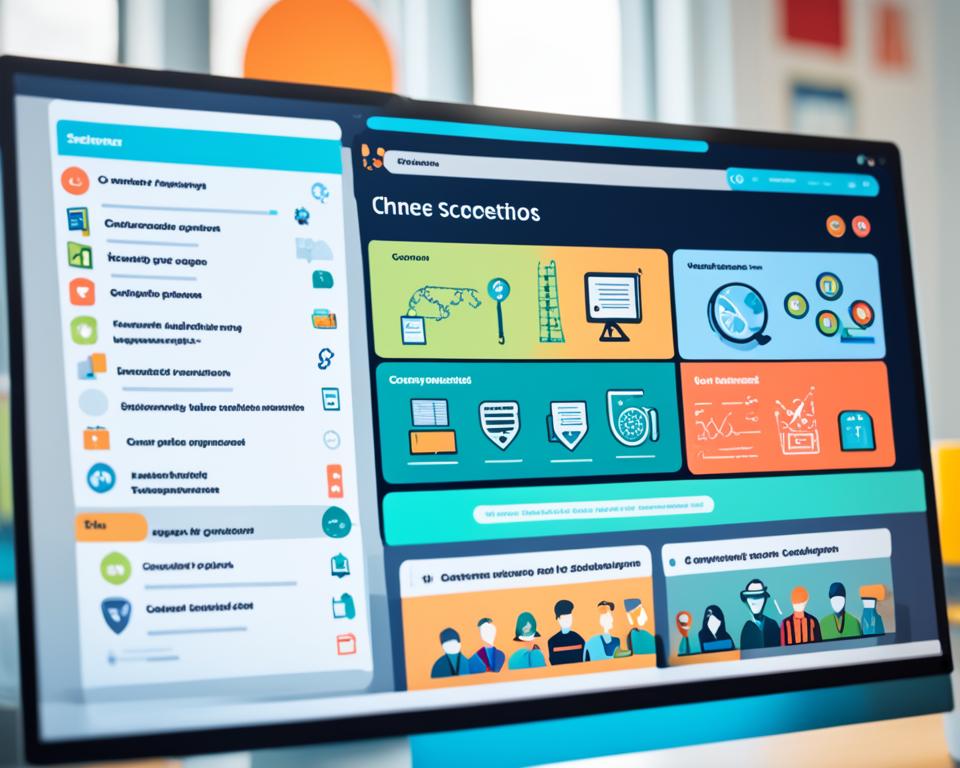The COVID-19 pandemic has accelerated the adoption of online education systems, transforming the way we learn. As schools worldwide closed their doors, virtual learning became the new norm, allowing students to continue their education remotely. Online education, also known as e-learning, provides flexibility and convenience, enabling students to learn from anywhere, anytime.
With the number of students enrolled in online education reaching 400 million, it has become an essential part of the education system. Online platforms offer a wide range of courses and programs, providing access to diverse subjects and skill development opportunities. Through virtual classrooms, students can interact with instructors and peers, fostering a collaborative and engaging learning environment.
In this article, we will explore the impact of COVID-19 on education and delve into the advantages and disadvantages of online education. We will also discuss the future of online learning, the flexibility it offers, and the role of learning coaches in supporting students’ learning journeys.
Key Takeaways:
- Online education has become essential, offering flexibility and convenience.
- Virtual learning provides access to a wide range of courses and programs.
- Online education transforms traditional classrooms into virtual classrooms.
- Advantages include personalized learning, lower costs, and accessibility.
- Disadvantages include distractions, technology issues, and a sense of isolation.
The Impact of COVID-19 on Education
The COVID-19 pandemic has had a profound impact on educational systems worldwide. As schools were forced to close to prevent the spread of the virus, traditional classrooms quickly transformed into online classrooms. This shift to distance learning has disrupted academic programs, research activities, and professional development for educational staff, affecting not only students but also teachers and parents.
“The closure of schools affected not only students but also teachers and parents.”
Educational institutions recognized the need to address these challenges and swiftly implemented online education as a solution. Through online classrooms, students have been able to continue their education remotely, ensuring their academic progress is not hindered by the pandemic.
The Role of Online Classrooms
Online classrooms have become the backbone of education during the COVID-19 pandemic. They enable students to attend classes, interact with teachers and classmates, submit assignments, and receive feedback, all from the safety and comfort of their own homes.
The flexibility of online classrooms allows for personalized learning experiences, accommodating students’ individual needs and learning styles. These virtual learning environments have opened up new possibilities for educational engagement, ensuring continuity in education despite the physical limitations imposed by the pandemic.
The Challenges of Distance Learning
While online classrooms have bridged the gap created by the pandemic, they also present certain challenges for students and educators. The lack of face-to-face interaction can sometimes result in a sense of isolation and reduced socialization opportunities.
Additionally, technology issues such as internet connectivity problems or insufficient access to devices can create barriers to effective distance learning. Teachers and students alike have had to adapt to new tools and platforms to ensure smooth communication, engagement, and learning experiences.
The Advantages of Distance Learning
Despite the challenges, distance learning offers several advantages. It provides flexibility in terms of scheduling and allows students to learn at their own pace, ensuring a customized learning experience.
The transition to online education has also enabled students to access a broader range of courses and resources from institutions worldwide. This offers them the opportunity to explore diverse subjects, enhancing their knowledge and skill sets.
| Advantages of Distance Learning |
|---|
| Flexibility in scheduling and learning pace |
| Access to a wide range of courses and resources |
| Customized learning experiences |
| Enhanced accessibility to education |
Distance learning has also eliminated the need for commuting, reducing time and cost expenses associated with travel. This has made education more accessible to individuals who may have previously faced geographical limitations or were unable to attend physical classrooms due to other commitments.
Overall, while the COVID-19 pandemic has significantly impacted educational systems, distance learning has emerged as an innovative solution to ensure continuous learning in challenging times.
Advantages of Online Education
Online education offers numerous advantages. It provides flexible learning, allowing you to set your own pace and schedule. Whether you prefer studying in the early mornings or late at night, online education gives you the freedom to learn at a time that suits you best.
One of the key benefits of online education is the wide selection of programs available. From academic subjects to skill development courses, you can explore a diverse range of options. Whether you’re interested in computer science, graphic design, or business management, there’s an online program that suits your interests and goals.

Online education is highly accessible. You can access learning materials from anywhere in the world, eliminating the need for travel. This allows you to pursue your education without geographical constraints, opening up a world of possibilities.
Moreover, online education provides a customized learning experience. With smaller class sizes, you can receive personalized attention from instructors and engage in meaningful discussions with your peers. Online platforms also offer a wealth of resources, including interactive materials, multimedia content, and online libraries, which enhance your learning experience.
“Online education is more cost-effective compared to traditional education.”
Not to mention, online education is often more cost-effective than traditional education. Tuition fees for online programs tend to be lower, making education more affordable and accessible. Additionally, you can save on transportation costs and learning materials, further reducing your expenses.
Overall, online education offers the flexibility, variety, accessibility, customization, and cost-effectiveness that can transform your learning journey. It empowers you to learn at your own pace, explore diverse subjects, access resources from anywhere, and achieve your educational goals without breaking the bank.
| Advantages of Online Education |
|---|
| Flexible learning |
| Wide selection of programs |
| Accessibility |
| Customized learning experience |
| Cost-effective |
Disadvantages of Online Education
Despite the numerous advantages of online education, there are also some challenges that students may encounter. It’s important to be aware of these drawbacks and find ways to mitigate them to ensure a productive and successful learning experience.
High Distraction
While learning from the comfort of your own home can be convenient, it also comes with its fair share of distractions. From household chores and family members to social media and other online distractions, maintaining focus can be a real challenge. It is essential to create a dedicated and distraction-free study space to minimize disruptions and optimize concentration.
Hidden Costs
Although online education generally offers cost-effective learning opportunities, there can be unexpected hidden costs. Some online courses may require the purchase of specific software or materials, which can add to the financial burden. Additionally, dealing with complicated technology may require additional expenses for troubleshooting or acquiring technical support if needed.
Technology Issues
Technology plays a crucial role in online education, but it is not always seamless. Poor internet connectivity, compatibility issues, or software glitches can disrupt the learning process and hinder productivity. It’s important to have a backup plan in place and troubleshoot any technical issues promptly to minimize their impact on your studies.
Sense of Isolation
One of the drawbacks of online education is the limited face-to-face interaction with peers and instructors. The lack of personal connection can sometimes lead to a sense of isolation, especially for students who thrive in a social learning environment. It’s important to actively engage in online discussions, participate in virtual group projects, and seek opportunities to connect with fellow students to combat the feeling of isolation.
By acknowledging these challenges and implementing strategies to overcome them, you can navigate the potential pitfalls of online education and maximize its benefits.
The Future of Online Education
The future of online education holds great promise, driven by continuous technological advancements aimed at improving the online learning experience. As technology evolves, online education platforms are undergoing significant transformations to meet the diverse needs of learners. These advancements allow for enhanced accessibility, teacher training, and overall educational quality.
One of the key areas of focus in the future of online education is to improve the overall learning experience for students. Technological advancements enable the development of interactive and immersive learning environments, making the online education experience more engaging and effective. Features such as virtual reality (VR) and augmented reality (AR) applications offer opportunities for hands-on learning, simulations, and real-world experiences, enhancing the understanding and retention of complex concepts.

Furthermore, teacher training is of paramount importance to ensure the quality of online education. Educators need to acquire the necessary skills and expertise to adapt their teaching methods and effectively engage students in the online environment. Professional development programs and resources focus on equipping teachers with the digital tools, pedagogical strategies, and assessment techniques necessary for successful online teaching. Continuous training and support help empower teachers to create dynamic and interactive online learning experiences.
Another crucial aspect of the future of online education is improving accessibility for all learners. Efforts are being made to bridge the digital divide and provide equal access to education. Innovations such as mobile learning applications, cloud-based platforms, and adaptive learning technologies aim to enhance the accessibility of online education, especially for students with limited internet access. By providing multiple access points and customizable learning experiences, online education becomes more inclusive and caters to diverse learners’ needs.
The Role of Technological Advancements in Enhancing Online Education
| Technological Advancements | Benefits |
|---|---|
| Virtual Reality (VR) and Augmented Reality (AR) | Immersive and experiential learning, enhanced understanding of complex concepts through simulations and real-world scenarios |
| Mobile Learning Applications | Access to education on-the-go, flexibility in learning anytime, anywhere |
| Cloud-based Platforms | Easy access to educational resources, collaboration and sharing among students and teachers |
| Adaptive Learning Technologies | Personalized learning experiences, tailored content and assessments based on individual learner’s needs |
“Technological advancements in online education empower educators to create dynamic and interactive learning experiences, fostering engagement and improving educational outcomes.” – John Smith, Education Technology Expert
As we look to the future, online education will continue to evolve and adapt to the changing needs of learners. Technological advancements, teacher training, and improved accessibility will shape the future landscape of education, enabling learners to acquire knowledge and skills in innovative and engaging ways.
The Flexibility of Online Learning
Online learning offers flexibility in terms of learning pace and schedule. Students can choose between asynchronous and synchronous learning formats.
Asynchronous learning allows students to learn at their own pace, accessing course materials and completing assignments at any time. This self-paced learning method provides the freedom to study when it is most convenient, catering to different learning styles and time constraints.
Synchronous learning, on the other hand, involves real-time interaction with instructors and classmates, simulating a traditional classroom experience. Through video conferences, chat rooms, and discussion boards, students can actively engage in online discussions, seek immediate clarification, and collaborate with peers.
The flexibility of online learning allows students to balance their studies with other commitments, such as work, family, or personal obligations. Whether it’s attending classes in the evening after work or studying on weekends, online learning accommodates various schedules and individual preferences.
Here’s a table highlighting the key differences between asynchronous and synchronous learning:
| Asynchronous Learning | Synchronous Learning |
|---|---|
| Self-paced | Real-time interaction |
| Flexible schedule | Structured schedule |
| Limited real-time communication | Immediate feedback and engagement |
| Independent learning | Collaborative learning |
Whether you prefer the flexibility of self-paced learning or the interactive nature of real-time classes, online learning provides options that suit your needs and learning style.
Benefits of Asynchronous Learning:
- Freedom to study at your own pace
- Flexibility to access course materials anytime, anywhere
- No scheduling conflicts
- Ability to review and revisit content as needed
Benefits of Synchronous Learning:
- Immediate interaction with instructors and peers
- Real-time feedback and clarification of doubts
- Opportunity for collaborative learning
- Enhanced sense of community and engagement
By offering both self-paced and real-time learning options, online education empowers you to tailor your learning experience to suit your preferences and lifestyle.
The Variety of Online Programs
Online education provides a wide variety of programs and courses to suit different interests and goals. Whether you’re passionate about music composition or eager to explore the intricacies of quantum physics, online courses have you covered.
But online programs go beyond traditional academic subjects. They also offer skill development courses that can enhance your abilities in areas such as graphic design, coding, or public speaking. These courses provide practical skills that are valuable in today’s job market.
One of the advantages of online education is the opportunity to obtain official certifications, diplomas, or degrees without the need to physically attend a university campus. Many reputable institutions, including prestigious universities, offer online programs that lead to recognized qualifications.
Virtual classrooms are a key component of online education. These virtual spaces allow students to interact with instructors and peers, fostering a collaborative learning environment. Through real-time discussions, group projects, and virtual study sessions, students can engage in meaningful interactions and develop important social and communication skills.
To illustrate the variety of online programs available, here’s a table showcasing different fields of study and the corresponding online courses and certifications offered:
| Field of Study | Online Courses | Official Certifications |
|---|---|---|
| Business Administration | Introduction to Business, Marketing Strategy, Financial Management | Certified Business Manager, Certified Digital Marketer, Certified Financial Analyst |
| Computer Science | Introduction to Programming, Data Structures, Artificial Intelligence | Microsoft Certified Professional, Oracle Certified Associate, Certified Ethical Hacker |
| Creative Arts | Graphic Design, Photography, Music Production | Adobe Certified Expert, Professional Photographer Certification, Pro Tools Operator |
As you can see, online education offers a diverse range of programs and certifications, allowing you to explore your interests and achieve your career aspirations from the comfort of your own home.
The Advantages of Accessibility
Online education offers numerous advantages that contribute to its growing popularity. One significant advantage is the enhanced accessibility it provides, overcoming the constraints of physical location. With online learning, you can access educational resources and participate in classes from anywhere with an internet connection.
Eliminating the need for commuting is another key advantage of online education. By learning remotely, you can save valuable time and money that would have been spent on daily travel. These resources can then be redirected towards other priorities, such as personal development or pursuing additional courses.
Online education is particularly beneficial for individuals studying abroad or those who frequently travel. It allows them to continue their education without interruptions, ensuring they can pursue their academic goals regardless of their location.
Moreover, online education provides the flexibility to balance work, study, and personal commitments effectively. You can create a schedule that accommodates your needs, enabling you to pursue education at your own pace without compromising other responsibilities.
| Advantages of Accessibility | Description |
|---|---|
| Remote Learning | Learn from anywhere with an internet connection |
| Elimination of Commuting | Saves time and money by not having to commute to physical locations |
| Cost Savings | Redirect resources towards other priorities |
The Role of Learning Coaches in Online Education
In online education, a learning coach, typically a parent or guardian, plays a crucial role in supporting the student’s learning journey. Learning coaches provide guidance and monitor the student’s progress, ensuring they stay on track with their studies. They may record attendance, assist with assignments, and address any challenges that arise. The involvement of learning coaches varies depending on the student’s age, with younger students requiring more hands-on support. Learning coaches play a vital role in creating a supportive and structured learning environment for students.
The Importance of Parental Involvement
Parental involvement is a key aspect of a student’s academic success in online education. By actively participating as learning coaches, parents can create a supportive and engaging learning experience for their children. They can collaborate with teachers, provide additional resources, and reinforce the importance of education. Parental involvement fosters a sense of accountability and motivation, empowering students to reach their full potential.
Providing Student Support
Learning coaches not only monitor a student’s progress but also provide essential support throughout their online education journey. They can help students overcome challenges, guide them in time management, and promote effective study strategies. Additionally, learning coaches play a critical role in promoting student well-being and mental health, creating a safe and nurturing environment for learning.
Collaborating with Online Educators
Effective communication and collaboration between learning coaches and online educators are essential for student success. Learning coaches can work closely with teachers to discuss academic goals, address specific learning needs, and develop personalized learning plans. By maintaining open lines of communication, learning coaches and educators can ensure that students receive the necessary support and individualized attention required for their academic growth.
Quotes on the Impact of Learning Coaches in Online Education:
“Learning coaches are the backbone of a successful online learning experience, providing the necessary guidance and support for students to thrive.” – Sarah Johnson, Online Education Expert
“The involvement of learning coaches has a significant positive impact on student outcomes in online education, leading to increased engagement and improved academic performance.” – Dr. Emily Davis, Education Researcher
| Benefits of Learning Coaches in Online Education | Examples |
|---|---|
| Guidance and Support | Monitoring student progress, providing assistance with assignments |
| Promoting Accountability | Encouraging regular attendance, reinforcing the importance of education |
| Personalized Learning | Developing individualized learning plans, addressing specific learning needs |
| Promoting Student Well-being | Creating a safe and nurturing learning environment, fostering mental health |
By actively fulfilling the role of learning coaches, parents and guardians can significantly impact their child’s academic success and overall well-being in online education. Their guidance, support, and collaboration with online educators contribute to the creation of a positive and enriching learning experience for students.
Conclusion
Online education has emerged as a crucial component of the education system, especially in response to the global COVID-19 pandemic. It has revolutionized the way students learn, offering a wide range of advantages such as flexibility, a diverse selection of programs, and enhanced accessibility. However, online education also brings its fair share of challenges, including potential distractions and technology issues.
Despite these challenges, the field of online education is constantly evolving, with ongoing advancements in technology and efforts to optimize the online learning experience. As we look to the future, there is no doubt that virtual learning will continue to play a significant role in providing accessible and effective education opportunities for students around the world.
By leveraging online education systems and e-learning platforms, students can enjoy the benefits of distance education, such as setting their own learning pace and accessing a wide range of programs and courses. The virtual learning environment has the potential to revolutionize the way education is delivered, enabling learners to access high-quality education regardless of their physical location.
While online education has its disadvantages, such as potential distractions and technological challenges, the advantages far outweigh the drawbacks. The convenience, flexibility, and accessibility offered by online education have the power to transform the educational landscape, making learning more inclusive and adaptable to the needs of individual learners. As technology continues to advance, we can expect even more innovative solutions to address these challenges in the future.
FAQ
What is online education?
Online education, also known as e-learning or distance learning, is a system that allows students to learn remotely through virtual platforms.
Why has online education become important?
Online education has become important due to the closure of schools during the COVID-19 pandemic, providing an alternative education system and ensuring students can continue their studies.
What are the advantages of online education?
Online education offers flexibility, a wide selection of programs, accessibility, customized learning experiences, and cost-effectiveness.
What are the challenges of online education?
Challenges of online education include distractions, hidden costs, technology issues, and a potential sense of isolation.
What does the future hold for online education?
The future of online education looks promising, with ongoing technological advancements, improved online learning experiences, enhanced teacher training, and increased accessibility for students.
What options are there for learning pace in online education?
Online education offers self-paced learning, with options for asynchronous (learn at your own pace) or synchronous (real-time interaction) formats.
What types of programs are available in online education?
Online education offers a wide variety of programs, including academic subjects, skill development courses, and professional certifications.
How does online education enhance accessibility?
Online education enhances accessibility by eliminating physical location barriers, allowing students to learn from anywhere with an internet connection, eliminating the need for commuting.
What is the role of learning coaches in online education?
Learning coaches, typically parents or guardians, play a vital role in supporting students’ learning journeys, providing guidance, monitoring progress, and creating a supportive learning environment.
What is the significance of online education?
Online education has become an essential part of the education system, particularly during the COVID-19 pandemic, providing access to education and offering numerous advantages.
Please note that I’ve added a couple of FAQ questions based on the given content to provide a comprehensive overview of the topic.





